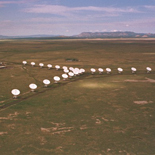
Very Large Array (NRAO/AUI)
UGS - Spring 2010
EXTRATERRESTRIAL LIFE
Unique Nos. 63985, 63990, 63995, 6400, 64005, 64010, 64105, 64020, 64025, 64030, 64035, 64040
Professor
RLM 15.204 · (512) 471-6446 (office), 478-2748 (home) · email
Courses - Spring '10 | Course Website
Another continuing assignment will be to subscribe to and look at the astrobiology “news” reports at www.astrobio.net. In part, this assignment is intended to offer a visual overview of the topics we cover, since your textbook is affordable primarily because it contains few illustrations. You will also find this site a way to become familiar with the kinds of questions relevant for our class early in the semester. Familiarity like this is important for understanding the material. I will include 1-2 questions on these “news stories” on each exam.
Final letter grades: Your final grade will be computed as follows:
5 exams with lowest weighted ½, at 100 points each, gives 450 points possible for a perfect exam score.
The research paper, worth 15.4%, contributes 100 points (now you see why 15.4 instead of a round number).
Each of the 5% assignments is worth 33.3 points each, for a total of 100 points.
The total number of points possible is then 650 points. Letter grades will be assigned as follows.
A: 565 points and higher (>87%)
B: 500-564 (77 to 86.9%)
C: 436-499 (67 to 76.9%)
D: 360-435 (57 to 66.9%)
F: less than 360 points.
Notes: 1. I am not assigning plus or minus letter grades. 2. There is no extra credit possible, so don’t ask.
Special requests: If you have any special request of any sort (excluding those not allowed, like lowering the grade cutoff), please put the request in writing, preferably by email, or call me on the phone. Please state clearly and explicitly your request and why it is reasonable. Include a phone number so that I can contact you about your request.
Obviously (I hope) this procedure does not apply to minor requests such as “Could you write a little larger on the board?” etc. Any suggestions for improvement of the class as we proceed will be greatly appreciated, either in person, by phone, or by email.
Attendance: Although I will not take attendance records, you should keep in mind that the exams are based heavily on the lecture material (as well as the textbook and any other readings), and that the “notes” that I will make available to you are only outlines or abstracts of my lectures. The biggest single danger in this course is that you fall far enough behind, either through lack of reading or spotty attendance, that you cannot really understand the material being covered. In addition, I often try to give examples of future exam questions during lecture. I therefore urge you to attend all classes, and ask questions if you don’t understand something. In contrast, attendance will count toward your participation grade in the discussion section.
Dropping the course: (see http://registrar.utexas.edu/calendars/08-09/index.html and General Information, ch.4, for details of required approvals, and the timetable for various kinds of adds/drops.)
Incompletes: An incomplete (X) will only be considered in extreme cases, for students who cannot complete the required course work for reasons other than lack of diligence (illness or other imperative nonacademic reasons), but only if the student has a passing grade on the work completed.
Cheating: Academic dishonesty will result in failure of the course and a report to the Dean of Students, who will decide on further action. Because of the large size of this class and the temptations involved, it will be important to keep your eyes from wandering and to guard your own exam. Students near the rear of class should try to sit one seat apart. Also, bring your UT ID card with you to exams and be prepared to show this card if asked.
Student observing opportunities: (call 471-5007 or see http://outreach.as.utexas.edu/public/viewing.html for Monday updates; information below is tentative)
Students interested in observing the night sky through small telescopes have several opportunities. 1. The Painter Hall Observatory has UT Student/Staff Night on Fridays and Public Night is on Saturdays. These sessions are free and open to all ages; no reservations are required. 2. The Astronomy Department sponsors weekly “Star Parties” on the 18th floor observing deck of R. L. Moore Hall on Wednesdays. This is free and open to the public. Call phone number or see url listed above for current times. This is not an assignment for the class, and is only here for your information.